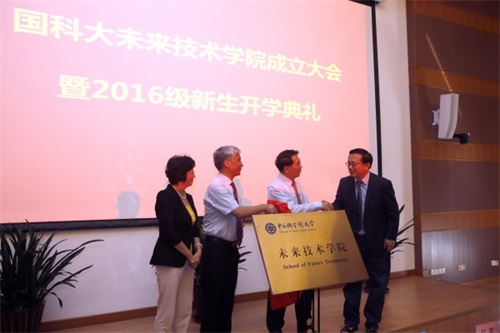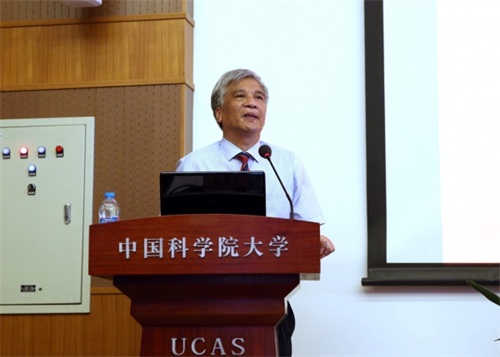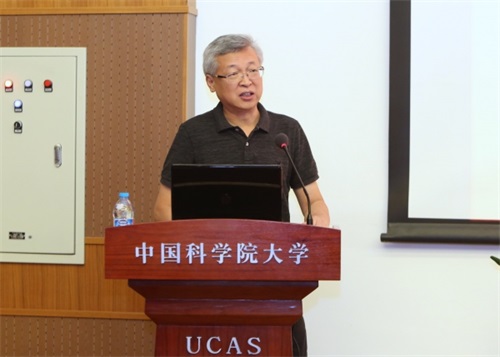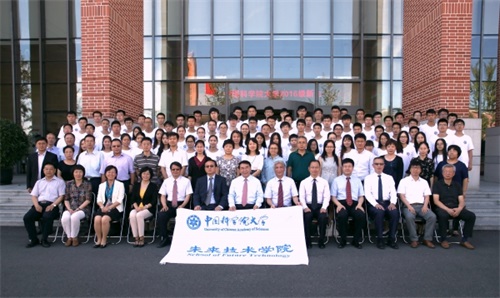On the morning of Aug. 31, the conference for establishment of the School of Future Technology, University of Chinese Academy of Sciences was held solemnly in the International Conference Center, Yanqi Lake Campus. Different from previous such conferences for secondary colleges chaired only by a vice president of the University, Bai Chunli, CAS President and Ding Zhongli, CAS Vice President and President of University of Chinese Academy of Sciences, were present at the conference and unveiled the School simultaneously. In addition, 5 CAS academicians and 6 directors and vice directors of relevant institutes under CAS also attended the conference, showing special significance of establishment of the School as a secondary one. Research Fellow Zhao Wei, Director of XIOPM, attended the conference under the invitation and accepted the engagement to be a vice president of the School and the director of the Teaching and Research Section for Photon and Quantum Chip Technologies.
Future technologies mean the sciences and technologies that aim at the future but have not been traced and simulated at present. Researches on future technologies are designed to explore those technologies that human being can expect or foresee but have not been applied by far, can only be mastered and used by human being in a certain period in the future, and are generally “original, cross and revolutionary”. If history traced back to 1930s, nuclear magnetic resonance phenomenon would belong to a “future technology”. With crossing of many disciplines of mathematics, physics, chemistry, biology, medicine and information, etc. nuclear magnetic resonance has changed traditional measurement mode, been widely used in many sectors including medical diagnosis, material testing and oil exploration, and become a contributor to six sessions of Nobel Prize winners in succession.
According to introduction of Academician Ding Zhongli, CAS Vice President and President of University of Chinese Academy of Sciences, the School of Future Technology is designed to explore, research and develop the technologies aiming at the future and able to reshape people’s life, industrial production and commercial consumption modes even lead to revolutionary progress of global economy. The School is established with the hope to drive stride-over of China’s science and technology level from following to leading, provide supports for major issues in China’s industrial structure adjustment, economic transformation and natural security, speed up scientific discovery and technological innovation, and lead industrial development.
According to the planning, through about 15 years of efforts, the School will form a talent team with important influence in science and teaching of cutting-edge, cross and future technologies, build an internationally leading inter-discipline cross talent training base and cutting-edge cross science and technology research base, form 5-7 cross-discipline or new subjects with unique influence in the world and sound multi-discipline cross student training system, become a model in cutting-edge cross discipline and future technology education and teaching, generate several significant original innovative results in cutting-edge cross disciplines and future technology fields, and lead and drive development of emerging fields.
The School is built in accordance with CAS’s “science-teaching integration” mechanism and system, and constructed under the leadership of Technical Institute of Physics and Chemistry, CAS, and supported jointly by Institute of Automation and Institute of Microelectronics, CAS, XIOPM, and Beijing Institute of Genomics, etc. Under the College there are 7 teaching and research sections, of which the Teaching and Research Section of Brain Science and Intelligence Technology will be headed by Research Fellow Xu Bo, Director of the Institute of Automation, the Teaching and Research Section of Photon and Quantum Chip Technology by Fellow Research Zhao Wei, Director of XIOPM, the Teaching and Research Section of Optical Matter Science and Energy Technology by Research Fellow Li Yi with the Technical Institute of Physics and Chemistry, the Teaching and Research Section of Bionic Intelligent Material Science and Technology by Research Fellow Wang Shutao with the Technical Institute of Physics and Chemistry, the Teaching and Research Section of Bio-Chip Technology by Research Fellow Huang Chuanjun with the Institute of Microelectronics, the Teaching and Research Section of Liquid Metal Matter Science and Technology by Research Fellow Liu Jing with the Technical Institute of Physics and Chemistry, and the Teaching and Research Section of Genomics Health Technology by Research Fellow Xue Yongbiao, Director of the Institute of Genomics.
It is reported that the School of Future Technology does not make its layout at the angle of disciplines but proceeds from core, key issues in fields of material, information, energy and life science, and gives full considerations to inter-field mutual crossing and integration when setting research orientation. Tutors for the School will also be selected from CAS system, and required to be young and energetic, active in thinking, in line with position of future technologies, willing to devote them to research and teaching of future technologies, and able to jointly research and grow with students together.






